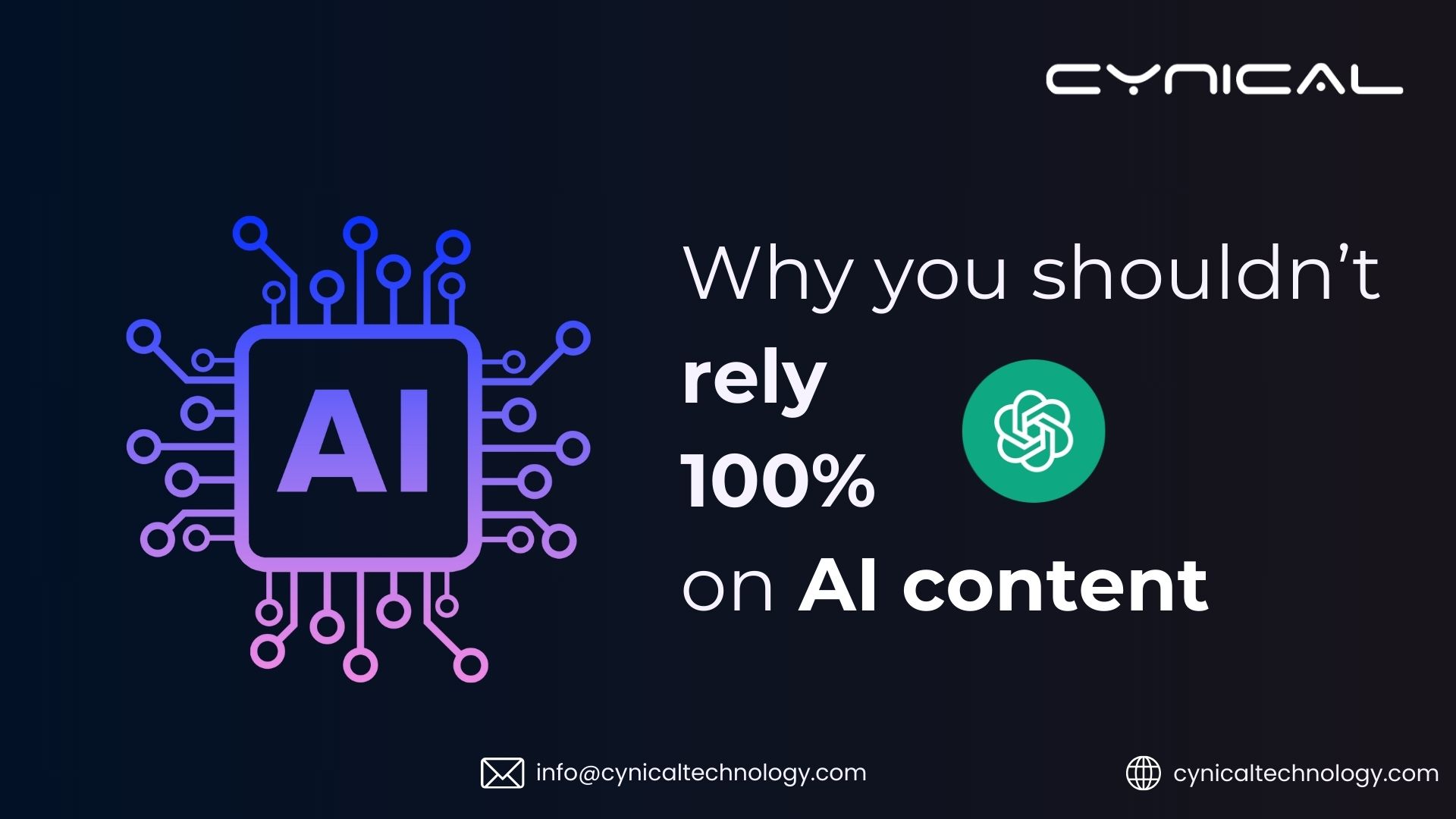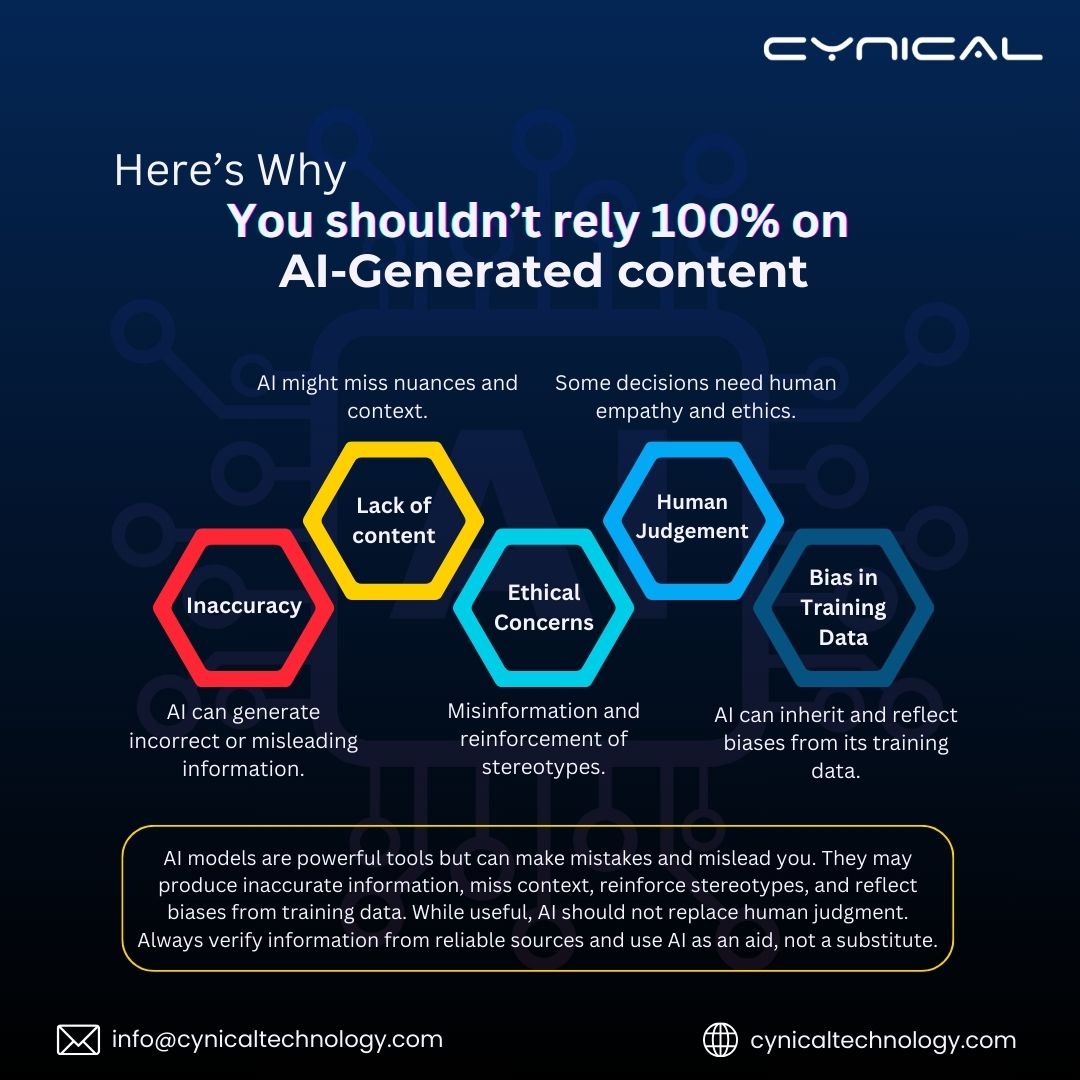- July 24, 2024
- Posted by: Bikash Sharma
- Category: Awareness

Why You Shouldn’t Fully Trust AI-Generated Content
In the age of digital transformation, Artificial Intelligence (AI) has become an integral part of our lives. From virtual assistants like Siri and Alexa to AI-driven customer service chatbots , AI helps us in numerous ways. However, while AI can be incredibly useful, it is crucial to understand its limitations. Blindly trusting and relying on AI-generated content can lead to misinformation and unintended consequences. Let’s explore why it’s essential to maintain a critical eye when using AI-generated content, with some real-life examples.
1. Inaccuracy in AI-Generated Content
AI models are trained on vast datasets to understand and generate human-like text. Despite this, they can still produce inaccurate information. For instance, in 2020, OpenAI’s GPT-3 was asked to write an essay on a specific topic. While the essay was coherent and well-structured, it included several factual inaccuracies. This example illustrates that, although AI can generate content that appears credible, the information might not always be accurate.
Real-life Example: A well-known online publication used an AI tool to generate news articles. One such article incorrectly reported a celebrity’s death, causing widespread panic before the error was corrected. This incident highlights the potential for AI to spread misinformation if not properly monitored.
2. Lack of Context and Nuance
AI struggles with understanding context and nuance, which are crucial for generating meaningful and relevant content. It often relies on patterns from the data it was trained on, leading to responses that may not fully capture the subtleties of human communication.
Real-life Example: A travel company used an AI chatbot to assist customers with booking inquiries. A user asked for suggestions for a honeymoon destination. The AI suggested a busy business district known for conferences and meetings, clearly missing the context of a romantic getaway.
3. Ethical Concerns and Bias
AI models can unintentionally reinforce biases present in their training data. These biases can manifest in the content they generate, leading to ethically questionable or unfair outputs.
Real-life Example: A recruitment company implemented an AI tool to screen resumes. Over time, it became apparent that the AI was favoring male candidates over female candidates, due to biases in the historical data it was trained on. This bias resulted in a less diverse and inclusive hiring process.
4. The Need for Human Judgment
Certain decisions and interpretations require human empathy, ethics, and judgment, which AI cannot replicate. Relying solely on AI can lead to decisions that lack the necessary human touch and moral consideration.
Real-life Example: In healthcare, an AI system was used to prioritize patients for treatment. However, it overlooked the emotional and psychological needs of patients, focusing solely on clinical data. Human doctors had to step in to ensure a more compassionate approach to patient care.
5. Bias in Training Data
AI models learn from the data they are trained on. If this data contains biases, the AI will reflect these biases in its outputs. This can result in biased or unfair content, perpetuating existing prejudices.
Real-life Example: An AI model used for predictive policing was found to disproportionately target minority communities. This bias was rooted in historical crime data that reflected systemic inequalities, leading to unfair treatment and increased surveillance of these communities.
Conclusion: Use AI as an Aid, Not a Replacement
AI is a powerful tool that can augment our abilities and streamline tasks. However, it is not infallible. Inaccuracies, lack of context, ethical concerns, and biases are significant issues that can arise with AI-generated content. Therefore, it is vital to use AI as an aid rather than a replacement for human judgment. Always verify information from multiple reliable sources and apply critical thinking to ensure the content you rely on is accurate and fair.
At Cynical Technology, we embrace the benefits of AI while acknowledging its limitations. By maintaining a balanced approach, we can harness the power of AI without falling prey to its pitfalls.

